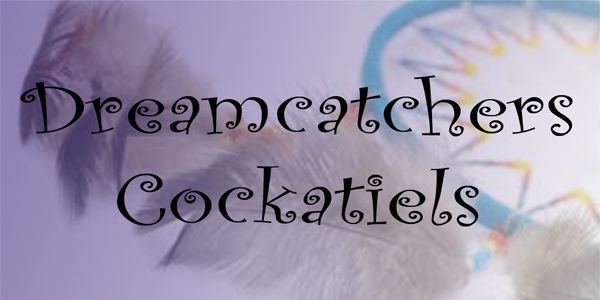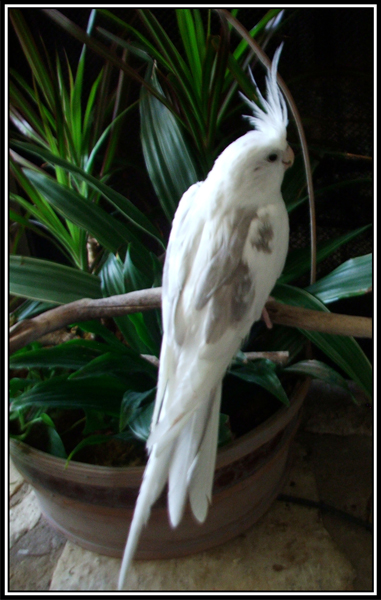
Purchasing
If you are interested in one or more of our birds, we recommend that you email us as soon as you are ready. Our breeding is limited and baby birds are often pre-sold. PLEASE NOTE - We NO LONGER maintain a waiting list. Due to poor follow up, we have stopped keeping a waiting list. If you are interested in a specific bird listed in our Available Page, please send us an email stating which bird you are interested in and we will get back to you as soon as possible. We accept cash and most credit cards can be processed through Paypal for payment on our birds. Shipping is NO LONGER available. Due to the cancelation of United Pet Safe shipping program, we will no longer be shipping birds. Arrangements can be made for deliveries via show transfers if you are an exhibitor.
Some things to know before bringing home your new buddy.
Your cockatiel will require a few things before coming home with you. To be prepared for your bird, you should have the following: A proper size cage to live in with food and water cups (cockatiels do not do well in parakeet size cages) - proper size cages must have 3/4" bar spacing or smaller please, multiple perches (various sizes to keep your bird's feet healthy and flexible and to avoid a debilitating affliction called bumblefoot - please do not use dowels - they are just not good for your bird), toys (to keep your bird entertained and stimulated), cuttlebone/mineral block with holder (provides necessary calcium for the health of your bird) and proper food. Some extra items that I have found helpful are; a small travel cage (in case you need to take your bird to the doctor), a bird bath (we use ceramic or glass bowls that can be cleaned easily), a millet holder (its a plastic holder to put spray millet in to keep it from breaking off and falling into the bottom of the cage and being fouled with feces).
To help new owners, we are more than happy to make recommendations in an effort to help you select proper cage and items for your bird. We can no longer offer a cage package with the purchase of your bird. We regret that due to a few individuals not following through with their order, we no longer have the capability to supply cages.
Cockatiel Food
Your bird and its parents living here at Dreamcatchers have been raised on a very diverse diet. When you bring home your baby, he or she should be continued on this diet or as close to this diet as possible for the rest of its life. Our experience has taught us what works well for our birds. Of course you are welcome to adjust the diet according to what is readily available to you, but a good general rule of thumb is that no bird should ever live on an all seed or all pellet diet.
So, what do our birds get on a given day?
Every day our birds are given a staple of a good pellet and healthy seed mix (this mix is about 1/4 pellet to 3/4 seed mix which we have created, however, we do recommend Higgins cockatiel seed mixes and either the In Tune Pellets and/or Roudybush Crumbles) which is available throughout the day. This formula varies according to seasons, activity, breeding, showing or if the birds are in the large flights or inside. The important factor is that your bird has a mix of good quality seed and pellet mix. The amount is approximately half to two thirds of the total daily diet. The rest of our bird's meal, and the more important in my opinion, consists of a cooked and raw food. We often offer this in the form of "chop". The Chop varies from all fresh raw items to 1/4 cooked and 3.4 raw. We vary this according to what is available and the seasons. We make the cooked portions in batches, place them in ice trays and freeze them to use as needed. The mash begins with cooked beans, lentils, barley, steel cut oats, brown rice and a very small amount of quinoa (quinoa is very high in protein and should be offered sparingly) along with some cooked squash, pumpkin or yams. This is all mixed together then portioned out for freezing. When we prepare the mash to feed, it is thawed and warmed, then we add a slice or two of either toasted and ground 7 grain bread or a piece of home made Birdy Bread ground up. The fresh portion of chop consists of finely chopped raw berries, raw ginger root and raw veggies. Vegetables may include: fresh corn on the cob (uncooked), kale, chard, celery, brocolli, califlower, peas, carrots, green beans, spinach, bean sprouts, alfalfa sprouts, mixed sprouts, peppers (especially jalapeno), cilantro, a pinch of fresh rosemary leaves, dandelion greens when available (be sure these are free of pesticides and washed well), pumpkin, yellow or zucchini squash - generally, whatever fresh vegetables are on hand. Each day we try to change the variety of what we use and the list goes on for what you can feed but Avocado and Onions are a no-no. Fresh fruits may include small amounts of chopped: apples, mango, bananas, strawberries, raspberries, blackberries (a real favorite), tangerine, oranges, watermelon, kiwi, pomegranate, etc... just make sure that the total fruit is less than 1/8 of the mash. Cockatiels will eat fruit but they are not overly fond of it. They do prefer greens and veggies.
Keep in mind to wash fresh fruit and Vegetables well and to chop in sizes your bird can handle, we use a food processor and make the pieces small but not blended smooth. The mash is served in a bowl separate from the dry seed/pellet mix so that it can be removed after a short time. Any uneaten fresh foods which will begin to spoil and produce bacteria can be harmful to your bird, warmer weather makes the mash spoil even faster - as a result, we do not feed mash in the summer but do continue to feed chopped greens and raw veggies. Discard the uneaten mash mixture.
And finally, as a treat, our birds get a little sprig of millet every other day.
Other fun treat foods may include: Plain Cherrios, plain granola (without chocolate, salt, or suger), plain crackers without salt, unsalted tortilla chip pieces. These can be given is very small amounts and as a treat, they should never be a part of the daily diet. Salted and sugared snacks are not good for your bird, even if they look cute eating it. There are further lists of appropriate foods available on the internet but the above is a good start. You birds will acquire their own likes or dislikes to certain vegetables and fruits. Don't give up on a vegetable or fruit after just one try. A fussy or finicky eater can be coaxed into eating the chop by mixing in a little seed in so that it looks familiar. To get your bird to try leafy greens, take a small bunch and hang from the side of the cage with a plastic clothespin.
A word of caution, when cooking around your bird - PLEASE NOTE - Teflon is VERY bad for your bird. Overheated teflon releases a toxin which will kill your bird very quickly. It is oderless and colorless and is found in virtually every non-stick type of treatment.
There are many no-nos on the internet as to what is good and bad for birds. There are also many other helpful sites which give great information, offer different recipes, and can be found on our links page.
Last but not least give lots of love and attention!
OUR GUARANTEE
We will be available to answer any followup questions you may have concerning your baby's well being. If we don't know the answer we will find out for you. We want you and your new family member to enjoy each others company for many years to come.
